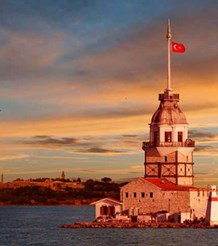
Foreign Investment in Turkey's Property Market set to Double
Turkish real estate has been popular with international property investors for more than 10 years, recording around 25,000 sales to foreigners annually.
Turkey builds around 700,000 properties each year
Despite sounding like a very healthy figure, Turkey builds around 700,000 properties each year with just 3.5% of sales going to foreign investors. However, rising investor sentiment over the last two years has led to industry professionals predicting a potential increase in foreign property purchases to 60,000 annually.
Haluk Sur of Cushman & Wakefield Turkey said: "There are no obstacles to Turkey reaching this volume. The country must however, act very carefully on the road to achieving this goal. The sector needs to focus on selling properties to foreigners who will use them with their families or for themselves, rather than potential buyers who make huge volumes of acquisitions in order to create big price fluctuations in the market".
Concerns are mounting that Turkey may follow the same path as the UK where investment has inflated house prices to an extent that homes have become less affordable in the domestic market for those wishing to buy their principal residence.
Sur added: "Turkey needs to develop solid policies to lure foreign buyers who want to use their potential homes in Turkey for several weeks or months rather than others who buy many properties just to sell on later or rent out."
Parallels are also being drawn between Turkey and Dubai in 2008, when the Emirate experienced a boom/bust in its housing market as a result of huge levels of foreign investment.
Turkey will be a very attractive market for foreigners
"Dubai faced this boom effect in the housing sector in 2008 and is still trying to normalise conditions. Acquisitions should spread to a wider geographical location at different price scales. When such a market is created, Turkey will be a very attractive market for foreigners," he added. Istanbul has received most investor attention among Turkey's property markets, particularly in the offices and hotels sectors although buyers are being urged to look further afield for value.
Mr Sur said: "It is not right to concentrate on Istanbul too much for the sector. Other centres of attraction must be created. Actually some cities elsewhere in the country have been developing rapidly such as Bursa in the northwest, Antalya on the Mediterranean, Izmir on the Aegean, etc. There are other centres that have huge growth potential including Gaziantep in the southeast or Kayseri in Central Anatolia. With the required infrastructure projects and employment opportunities, more people will opt to live in these cities".
Economically, Turkey has achieved relative stability in the last 2 years and annual GDP expansion of 4% is expected in 2016, creating a nice dynamic for investment. However, investment returns in Istanbul are unlikely to rival those found elsewhere in Turkey where prices are set to experience more gradual growth, presenting better margin opportunities for investors.






